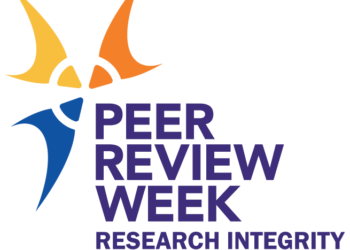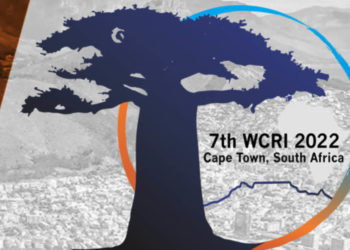Editor’s Note: Today’s post is by Natalie Simon, Paula Saner, De Ming Chau and Joeri Tijdink. Natalie is a communications consultant specializing in higher education and research. Paula is the Research Integrity Manager at the University of Cape Town’s (UCT) Office of Research Integrity (ORI). De Ming is a molecular biologist with experience in cancer stem cell research. Joeri is a Principal Investigator at the Ethics, Law and Humanities department of the Amsterdam UMC, location VUmc the Netherlands.
“Stand on the shoulders of giants,” Google Scholar encourages users with every new search. This phrase, originating from Sir Isaac Newton’s famous words, “If I have seen further it is by standing on the shoulders of giants,” highlights that in the global research system, researchers build on each other’s work. Historically, this habit has been stable and grounded in agreed upon norms and values. Through these norms, researchers replicate, extend, and sometimes improve their colleagues’ work. As noted in the National Academies of Sciences Report: Fostering Integrity in Research: “When undertaken with fidelity, science becomes a cumulative exercise that produces a growing body of reliable knowledge”.
Today, the field of research integrity (RI) focuses on the validity and trustworthiness of research endeavors. RI emerged to uphold the principle that scholars can rely on the work of their predecessors, and society can trust their research due to the necessary checks and balances inherent in the system.
The World Conferences on Research Integrity Foundation (WCRIF) aims to support this growing field by building a network of early career researchers and professionals (ECRPs) in research integrity. This network promotes peer-to-peer mentorship, supports ECRPs to further their careers in RI, and fosters a global community that supports research with integrity.
Challenges to Research Integrity
Both scientific and mainstream media have reported on the challenges facing the global research enterprise. This reporting is driven by a few high-profile misconduct cases, a rising rate of retractions, and the emergence of parasitic enterprises like papermills and predatory journals.
Several factors contribute to these challenges. Globally the economic value of investment in research and development (R&D) has become apparent. So too has the importance of investing in R&D to create a more sustainable and healthy future become a priority for governments and private funders. In 1966 global R&D funding stood at around $555 billion US dollars (USD), this increased to around $1 trillion USD in 2005 and to over $2.47 trillion USD in 2022.
As research activity expanded, so did the need to evaluate the value for money of the inputs (institutional core funding, research grants) and the quality of the outputs (research publications). While not intended for this purpose, the Journal Impact Factor became synonymous with the quality of a research paper. This combination of factors has led to a ‘publish or perish’ culture where researchers are judged primarily on their numbers of publications and citations, preferably in journals with high impact factors. This has resulted in unsustainable growth in research publications. In 2016, about 1.92 million papers were indexed in Scopus and Web of Science; by 2022, this number had risen to 2.82 million, despite a minor decline in the number of PhD graduates (as reported in Science). Researchers now face heightened pressure to write, edit, and review more papers. Similarly, the competition for research grants is fierce.
This demand occurs in an increasingly global scholarly ecosystem, where research teams often include institutions from different countries, each with its own laws, regulations, and ethical norms. While diverse teams often produce better research, they also place high demands on principal investigators, who spend much of their time on administration rather than research.
In such high-pressure environments, the standards of RI can slip. However, the research community is pushing back, advocating for systems that prioritize quality over quantity, such as the CoARA initiative in Europe. RI practitioners, a small but growing group from diverse fields, are leading this effort to foster integrity in their institutions or research groups. These RI practitioners face myriad challenges in this quite dynamic field, challenges that can be more easily overcome when working within a broader support network.
The rise of RI and the need for an ECRP network
RI emerged as a field in the late 1980s when the United States Committee on Science, Engineering, and Public Policy formed a 22-member panel to study scientific responsibility and research conduct. This effort defined the term “integrity of the research process” and identified categories of research misconduct, such as fabrication, falsification, and plagiarism.
Today, RI practitioners handle a variety of tasks. These range from awareness raising and training to ensuring the methodological quality of research, building a responsible research culture, fostering reproducibility, safeguarding good supervision of ECRPs, and advocating for principles of Open Science and balanced researcher assessment. They also often conduct research, which is critical to developing our understanding of the issues faced in the field, as well as the scale of some of the problems.
Also key to the role of an RI practitioner is staying on top of the latest challenges and trends. RI is a rapidly evolving field. New technologies continuously change how research is conducted and communicated, impacting the integrity of research. The rise of papermills and the use of generative artificial intelligence (AI) in research are just two examples of this. This fast-changing environment makes peer-to-peer mentorship crucial, as more experience doesn’t always equate to better or quicker solutions in the face of new challenges.
As in many emerging fields, there are more new entrants than established professionals in RI, and they come from very diverse backgrounds. At present, there is no bachelor of arts or science degree in RI. Some RI practitioners come from a research support or administrative background and work their way into the RI space. Others may be established researchers who support RI at their institutions in addition to their research work. But despite their different backgrounds and contexts, all are working to achieve similar goals: empowering researchers to make responsible decisions.
The value of this diversity of backgrounds is that different practitioners will have different perspectives and strategies for achieving this aim. The ECRP network seeks to create a space where individuals from all backgrounds and fields can share their experiences and learn from each other.
Another key challenge many RI practitioners face is relative isolation at their institutions. This differs widely depending on the context and needs of each institutional research environment. Some institutions may have understaffed or no RI offices, others may have large teams, and many have no specialized RI expertise at all but are striving to establish such a role. The individuals working in these different contexts all have very different experiences that are useful to share with colleagues.
Be part of the WCRI ECRP network
The RI ECRP network was launched at the 8th WCRI in Athens from June 2 to 5, but it is not exclusive to conference attendees. Through this network we hope to create a global support group that includes more established RI mentors willing and able to teach ECRPs how to navigate the sometimes choppy RI seas, but also celebrate the good and find ways to effectively support RI practitioners in their work. The ECRP Network will work closely with WCRIF and the WCRI community to strengthen global efforts in fostering RI.
If you wish to get involved or just be kept abreast of the ECRP network updates contact us at earlycareer@wcri2024.org. We look forward to collaboratively building the ECRP network and advancing the field of research integrity.




